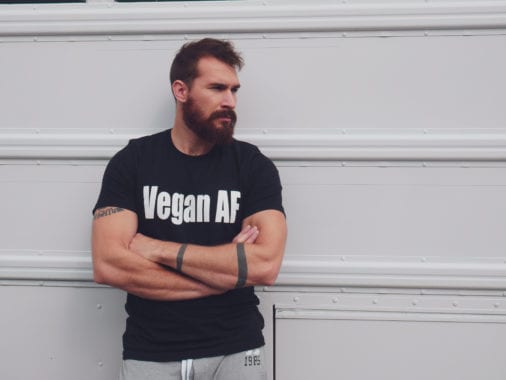Five Reasons We Are Vegan
When folks learn we are vegan, the reactions are always interesting and range from minor curiosity to immediately dismissive to outright hostile – Mike, in all his muscular, bearded, deadlifting glory, has been called gay and unmanly repeatedly from the “manly men” types who consider bacon a food group {as if gay is possibly the worst thing you could be – but I digress}.
Most people ask why we chose this lifestyle, followed closely by where we get our protein from, which is another post entirely.
So what are the reasons we are vegan?
Although there are many good reasons that encompass a broad variety of topics you would probably never think of, here are our top five reasons.

ANIMALS IN OUR FOOD SYSTEM LIVE SHORT, ABUSIVE LIVES IN HIDEOUS CONDITIONS THAT CULMINATE IN TERRIFYING AND PAINFUL DEATHS.
1. Let’s start with the most obvious reason – the animals.
One day, following a week-long series of documentaries that culminated in the truly hideous feature, Earthlings, we realized we could no longer ignore the complete inconsistency of being animal lovers while simultaneously eating them.
We have been born into a paradigm that allows us to cuddle with one animal while we kill and consume another, never questioning how or why we pick which is loved and which is food. In other parts of the world, for instance, cows are revered and dogs are eaten – a thought most of us would gag on, and yet the thought process is the same, it’s simply the choice of which is which that has changed.
When we realized this, the hypocrisy that we unknowingly practice through this inherited set of beliefs, we never touched meat again.
Couple that with the horrendous animal abuse farmed animals receive from the time they are born until the day they are slaughtered – standing cramped shoulder to shoulder in mountains of their own feces, no room to even lay down, animals a day old mutilated with no anesthetic so they don’t hurt each other in those incredibly stressful conditions, entire lives spent being repeatedly impregnated so they continue to be productive while their babies are taken almost as soon as they are born, slaughterhouses where animals, still alive and bleeding out slowly, are sent down assembly lines to be cut up – and you have a pretty compelling reason to start with.
THERE ARE PEOPLE STARVING IN COUNTRIES WHERE GRAIN IS SHIPPED AWAY TO FEED OUR MEAT ANIMALS.
2. If animal welfare is a lesser concern, then let’s look at the human population and how animal agriculture affects our fellow man.
There are somewhere around 1 billion people every year considered malnourished and/or starving, but the problem is not that we can’t produce enough food.
On a global scale, we produce enough grain to feed the world population twice over.
The problem is that the vast majority of this grown food goes to feed the immense population of animals that are destined for a dinner plate.
In 2011…seventy-seven percent of all coarse grains (corn, oats, sorghum, barley) and over 90 percent of all soy grown in the world was fed to livestock.(1)
A Harvard nutritionist estimated that if Americans ate just ten percent less meat a year, we could free up enough of that to feed 60 million people.(2)
Pause and think about that – just one country of people giving up meat for one meal of every ten. Imagine what we could accomplish if even a fraction of those became vegetarian or vegan.
JUST A FEW OF OUR FAVORITE VEGAN PROTEINS: SEEDS OF CHANGE Organic Quinoa & Brown Rice, Barilla Lentil Pasta, Vega Protein & Greens protein
OUR MEAT CONTAINS PUS AND CANCER, AMONG OTHER NOT SO APPETIZING ELEMENTS.
3. The meat in our food supply is gross.
Let’s talk about those inhumane and disgusting conditions I mentioned that our food supply lives in.
If an animal, for its entire life, is standing in feces, eating ground up bits and pieces of random food not at all natural to its internal makeup (corn, soy, and even ground up pieces of other animals), what do you suppose the chances it’s entirely healthy are?
Those animals walk into slaughter not only covered externally in the bacteria of their environment, but full of tumors and abscesses too numerous to be completely removed or checked by the USDA. All of these end up going into your meat.
In a large scale operation where money is the motivating factor, quick and cost-effective are more important than the consumer’s best interests.
At best, it is mixed with an ammonia meat product to hopefully kill most of those bacteria off. At worst – it’s the E. coli outbreaks we’ve become so used to reading about in the news.
For instance, scientists at the Johns Hopkins Bloomberg School of Public Health tested supermarket chicken flesh and found that 96 percent of Tyson chicken was contaminated with campylobacter, a dangerous bacterium that causes 2.4 million cases of food poisoning each year.(2)

OUR PLANET IS DYING AND ANIMAL AGRICULTURE IS ONE OF THE BIGGEST CONTRIBUTORS.
4. The facts on this one are almost too mind-boggling to comprehend, but do a Google search for “animal agriculture greenhouse gas” and read a few scholarly articles on the topic.
Hopefully, you’re as amazed as I was when you realize that livestock and their byproducts account for at least 32,000 million tons of carbon dioxide (CO2) per year, or 51% of all worldwide greenhouse gas emissions.(3)
If that’s not enough to do it for you, also consider that animal agriculture is estimated to be responsible for 80% of deforestation annually, uses a huge portion of clean drinking water to produce a relatively small amount of food (a single cow used for milk can drink 50 gallons daily), creates an incredible amount of pollution in the form of animal runoff that poisons rivers and lakes, and is contributing to a rapidly dying ocean as we over-fish and factory farm.(4)
STUDIES ARE PROVING THAT PLANT-BASED DIETS ARE NOT ONLY HEALTHIER BUT CAN ACTUALLY REVERSE DEGENERATIVE DISEASES.
5. When I started delving into the nutrition science behind my new diet and got away from the moral and ethical reasons I’d made that change, I found enough research on the effects of a plant-based diet on the human body to be their own singular reason to give up animal protein of any kind.
Vegans are less likely to develop heart disease, cancer, diabetes, and high blood pressure than meat eaters, and seem to avoid a host of metabolic issues.
If you don’t care about animals or the planet or even the other humans you share it with, do yourself a favor and watch a few documentaries (What The Health, for instance), follow up with some research and fact-checking, and realize that not only will you not be protein or nutrient deficient, you will actually thrive eating whole foods.
THE BIGGEST REASONS WE ARE VEGAN
What have I found in the time I’ve been vegan?
Physically I dropped 8 pounds within a few weeks but maintained all my strength, continuing to PR lifts at my lower weight and body fat. I also seem to recover faster and have fewer digestive issues.
Mentally I’m at peace because I know I’ve made a morally sound decision that was right for me.
It truly isn’t that difficult once you establish a few basics, and I’ve never once missed meat or felt like I was being deprived in any situation.
It’s becoming increasingly easy to find vegan options at most places we dine out at (even in our relatively small, meat and potatoes country city), food prep is much simpler sans dairy, egg and meat, and our food bill every week is quite a bit lower minus those high-cost items.
I’ve been a strict vegetarian since the day I listened to Joaquin Phoenix detail the horrors we inflict on animals simply by creating a demand with our grocery shopping, embracing a mostly vegan diet along the way (we occasionally make conscious decisions when we travel that aren’t strictly vegan), and I’ve never felt better, mentally or physically, in my life.
If you’re just curious enough to put the “I could never give up meat, ignorance is bliss” part of your brain to the side for just a moment, watch Forks Over Knives, Cowspiracy and Earthlings. You’ll learn about the health, environmental and animal welfare concerns associated with animal agriculture.
At the very least, you’ve educated yourself about reasons to be vegan, and knowledge is power, even if you decide not to do anything with it.
Maybe you’ll be prompted to make a few changes and cut back on meat, dairy and eggs – a conscious effort that does make a difference.
But perhaps the switch that flipped in my brain will also turn on in yours, the proverbial light bulb, and you’ll be one more person making lifestyle choices that contribute to a better, more compassionate and aware planet.
- https://www.forksoverknives.com/animal-agriculture-hunger-and-how-to-feed-a-growing-global-population-part-one-of-two/#gs.Qs9MxJo
- https://www.peta.org/living/food/vegans-care-humans/
- http://www.cowspiracy.com/facts/
- https://www.peta.org/issues/animals-used-for-food/meat-environment/



